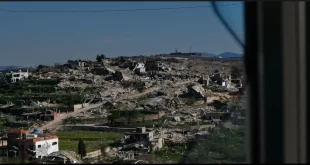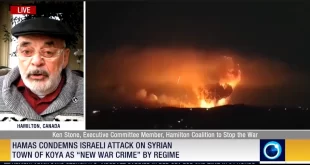The following article, by Julia Kassem, was published first at Counterpunch.
San Bruno-based video sharing website YouTube shut down multiple Syria-based accounts last Saturday in attempts to enforce media blackouts against Syrian state and their allied forces.
Among the sources removed included the accounts of the Syrian Ministry of Defense, SANA News Agency, and the Syrian presidency. The accounts have been taken down due to “violations to platform’s terms of service and legal complaints,” as an error message reads upon attempting to access the pages.
Damascus based Sama TV was also among the pages taken down, with the link to their channel broadcasting an error message reading “This page isn’t available. Sorry about that. Try searching for something else.”
Some news sources, including the Qatari funded and London based Al-Araby al-Jadeed (The New Arab) attributed the closure to a report by TomoNews, a Taiwanese outlet that produces short, highly sensationalized and often bizarre CGI clips of tabloids and news stories.
The article accused several of the Syrian channels of generating ad revenue that linked to the Syrian General of Radio and Television, the agency responsible for operating state-owned media.
The U.S. Treasury identified the agency as subject to sanctions in 2012, in accordance with a 2011 executive order prohibiting U.S. nationals from “engaging in business” with any “Syrian state-owned” entity.
It seems more likely however, that the West’s response to their loss in the Syrian proxy war, is that of firm desperation into winning the information war, by virtue of media and technology.
The termination came as Syria, with Russian assistance, waged a campaign to liberate Idlib, destroying rebel military equipment and bases, and incurring heavy losses from the terrorists. A day prior, SANA reported on the collaboration between militants from the Turkistan Islamic Party (TIP) and Hayat Tahrir al-Sham (HTS) and the White Helmets to identify key locations, where sarin and chlorine gas has been shipped, to launch a potential chemical weapons attack.
Meeting on Thursday in Jisr al-Shughour, the groups contended between al-Najia, a countryside region of Jisr al-Shughour, al-Hamawsh, and Kafr Nubbul as potential sites to launch a chemical attack from, according to the sources.
The account terminations have been carried out allegedly to muddle footage and coverage of another chemical attack waged by rebels, with the intent of framing Damascus and thus providing the justification for the US and its allies to strike Syria. Conveniently enough, YouTube’s media blackout came as Syria, with Russian assistance, launched strikes against over 100 opposition military targets.
Last week, the US threatened Syria with strikes, saying that it would respond “swiftly and appropriately” if chemical weapons were deployed, despite Russia’s warnings last month of “evidence” that shows the scheme to wage the attack.
On Saturday, Joseph Dunford, chairman of the US Joint Chiefs of Staff, disclosed that he was in “routine” dialogue with US President Donald Trump to give him “military options” that would enable the U.S. to strike Syria “in the event chemical weapons are used.
YouTube’s artificial-intelligence method of content flagging, recently introduced last year, is shaped by a mix of algorithm’s and human review, in part directed by NGOs such as the Anti-Defamation League (ADL), an organization that pushes to label criticisms of Israel as “anti-Semitic” as well as the London-headquartered Institute for Strategic Dialogue (ISD), and the NATO-funded Atlantic Council.
The platform’s censorship move, in the advent of the Syrian-led siege to liberate Idlib, isn’t the first US based platform to wage a crackdown of this kind. In August, Facebook removed nearly 650 “Iran-linked” accounts and pages that posted “anti-Saudi, pro-Palestinian” content.
And in 2012, Jared Cohen, CEO of Jigsaw and an Adjunct Senior Fellow at the Council on Foreign Relations, communicated with the State Department, disclosing a “pretty cool” use of the tool that would allow users to “publicly track and map the defections in Syria” in hopes of “encouraging more to defect and giving confidence to the opposition.”
Monopoly on Information
The saying “knowledge is power” in this day and age, pertains as much to who wields knowledge as much as who obtains it.
The connection between the forces that control technology and that shape the narrative in a society was the subject of monumental works of science fiction, such as Huxley’s 1932 “Brave New World.”
And it was Antonio Gramsci, in the cells of Mussolini’s prisons in the heydey of European fascism that identified the role of senso comune,in shaping a particular view of the world and events reflective of the institutions and producers of knowledge in that society.
Similarly, the U.S. led, western-backed monopoly of information has, for years, served to justify imperialist motives of regime change in Syria and in Iran.
A cohort of Washington based, corporate and foundation funded think-tanks routinely lobby Congressional members and collaborating with State Department officials on policy in Syria. Many statements and claims coming from US and UK government sources are unsullied from an unwavering commitment to regime change and the maintenance of the current geopolitical hierarchies of money and power, even if, as one WikiLeaks email from Jake Sullivan to Hillary Clinton admits, that “[Al-Qaeda] is on our side in Syria.”
Reports from international NGOs lauded in the West for championing humanitarian causes and campaigns such as Amnesty International have, at times, published falsified reports that led to disastrous foreign policy outcomes.
While many of their investigations and campaigns have brought light to many humanitarian concerns and causes over the years, a few reports, founded with faulty sources without verifiable evidence, have assisted pro-war propaganda campaigns.
The 1992 Amnesty International corroborated report of Kuwaiti babies taken out of incubators that gave ample justification for the US to launch its invasion of Iraq in 1992.
While the report was found to be false and retracted by the organization, the international NGO would go on to replicate its faulty practice of relying on third-party testimony, not using a variety of sources, and failing to cross-check sources in its February 2017 report titled “Human Slaughterhouse: Mass Hangings and Extermination at Saydnaya Prison, Syria.”
In both cases, the push for regime change involved the input from Gulf-backed sources financing propaganda campaigns. In 1990, it was New York based PR firm Hill & Knowlton through the “Citizens for a Free Kuwait” project that pushed for the most influential ways to win public support for intervention in Iraq.
In the mid 2000s, UK based PR firm Bell Pottinger collaborated with US military officials to produce falsified ‘coverage’ of al-Qaeda bombings to herald the US occupation of Iraq led by George H.W. Bush, launched in 2003.
And this time around, in Syria, propaganda pundits, among many others, include The Syria Campaign and Avaaz; the former which pushed to recognize The White Helmets as the recipients for the Alternative Nobel Prize, and the latter which spent millions smuggling medical equipment into rebel-held areas and journalists into Syria to produce pro-regime change content. Both also pushed to establish support for a no-fly zone in Syria, a move which even Durant said would “require war with Russia and Syria” and a practice Avaaz had already test-grounded in Libya in 2011.
The weaponization of technological content to obscure war crimes and Western support of them on YouTube is not unprecedented. In 2017, the channel for the Syrian Ministry of Defense was another time deleted, alongside others belonging to various opposition groups.
 Syria Support Movement solidarity with the Syrian people
Syria Support Movement solidarity with the Syrian people




